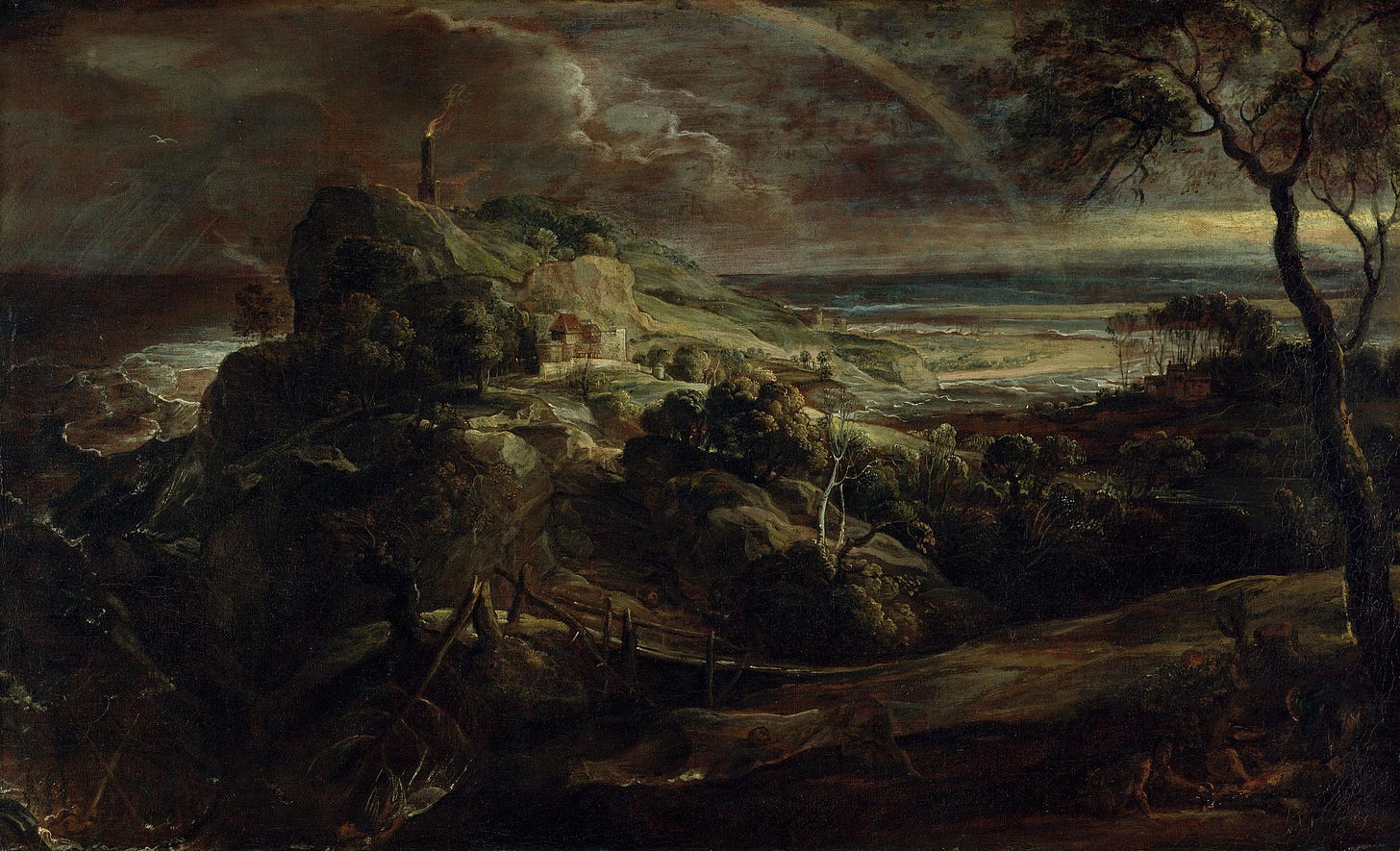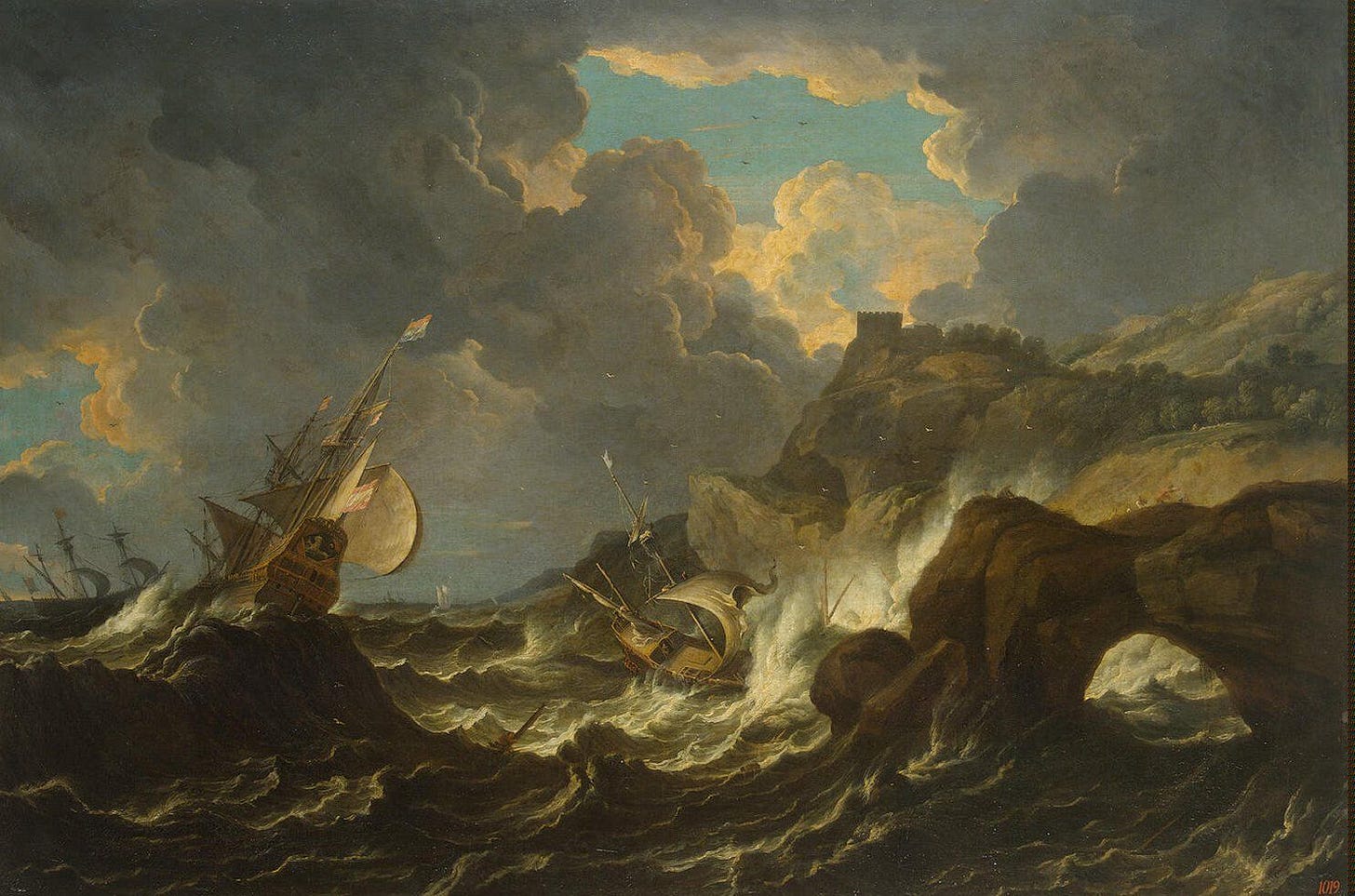We lay in our bed as in a tomb
awakened by thunder to the dark
in which our house was one with night,
and then light came as if the black
roof of the world had cracked open,
as if the night of all time had broken,
and out our window we glimpsed the world
birthwet and shining, as even
the sun at noon had never made it shine.
- Storm, Wendell Berry
Gloomy and brooding, many storms regularly sweep across the Irish Sea and crash into the west coast of the United Kingdom. Whether they creep up through Cornwall and Devon, or smash through Cumbria, they rarely are lethal enough to seriously affect those of us east of Britain’s backbone - the Pennines. We plucky, lucky few in the North East of England live in a rain shadow. Sheltered from the south by Yorkshire and from the east by Cumbria, we are often spared the worst of the weather, experienced by those on the other side of the hills.
Last week, the UK sheltered from the effects of our latest storm - Storm Ciarán - with some areas experiencing flooding, travel disruption, amongst a larger host of issues. As it tore up the South West, I was sat, glad to be in my house in the UK’s driest region but nascent romanticism strikes a more melodramatic tone within me.
Storms play an almost mythic role in the human psyche. Whether floods sweep away civilisations or wreck ships on the coast, the terror of the storm inhabits a deep-seeded place in the mythos of mankind. Storms remind us of our human limitations. They massive, overpowering forces of nature, which are beyond our ability to either fend off, stand resolutely in, even to simply weather. The storm humbles us.
For Homer, man constantly strives against the gods as he tries to carve out his own destiny. In the Iliad, Diomedes strikes out against b0th Aphrodite and Ares, wounding them in the wrist and the stomach respectively. The section of the Iliad devoted to Diomedes is the longest single heroic aristeia in the entirety of the Iliad and I think that is because Homer wants to get across the heroism of Diomedes in his ability to both defeat man and god in combat. For Homer, true masculinity seems to be found in the ability to exert power over not only other men, but also over the gods - to carve out one’s destiny by the tip of a spear.
In his poems, Homer explores the relationship between the active will of man and the hand of both the gods and of fate. In the Odyssey, Odysseus is a man flung here and there by the whims of the gods, some of whom seem to want to aid him, and others who wish to do him harm. The tempestuous relationship between gods and men is perhaps best exemplified by Poseidon. Although he runs to the aid of the Greeks against the Trojans during Homer’s Iliad, he is eventually angered by the actions of Odysseus, who blinds his cyclops son, Polyphemus, and escapes amongst his sheep during Homer’s Odyssey. In announcing his name to Polyphemus, Odysseus’s hubris is repaid when Poseidon wrecks his ship and kills his men in a great storm.
Unlike Diomedes, Odysseus is not fully able to exert his own will all of the time. Against man he may be triumphant, but against the gods not always. Homer reminds us that humans as powerful as Diomedes are truly mythic and even the smartest of men can easily be dashed upon the rocks and ruined.
The Bible is full of storms. Whether it is the cataclysmic flood or Jesus’s commanding of the storm on Lake Galilee, we get a sense of the otherworldly nature of storms - that they are something beyond us, both in our comprehension and our ability. We get a sense of the power of Almighty God and his ability to bring damnation and salvation all through the use of water.
The Apostle Paul meets with a storm while sailing to Rome to meet with the Emperor. In the 27th chapter of the Acts of the Apostles, we learn about his ill-fated trip across the Mediterranean. After warning the men of the probable demise of their voyage, Paul is shrugged off by the hubristic pilot and centurion, who ignore the sage advice of a man of God.
Now the tale takes a Homeric turn.
Paul is proven right. The ship runs into a storm. They struggle day and night to make headway. Their ship runs aground. It is dashed on the rocks.
But that is not the end of the story, nor of the lives of those on the ship with Paul that day. Unlike the wretched souls of Odysseus’s crew, Paul’s companions find themselves alive on the shore, having drifted in on different pieces of the wreck, where they are greeted by the friendly natives of Malta.
There is a key difference between the story of Odysseus and the story of Paul. Paul did not deign to think that he could fight God. His captors thought they could continue on through their own knowledge and ability. This hubris was their downfall. Despite this, salvation is brought to them by God.
‘Since they had been without food for a long time, Paul stood up among them and said, “Men, you should have listened to me and not have set sail from Crete and incurred this injury and loss. Yet now I urge you to take heart, for there will be no loss of life among you, but only of the ship. For this very night there stood before me an angel of the God to whom I belong and whom I worship, and he said, ‘Do not be afraid, Paul; you must stand before Caesar. And behold, God has granted you all those who sail with you.’ So take heart, men, for I have faith in God that it will be exactly as I have been told. But we must run aground on some island.”’
- Acts 27:21-26 (My emphasis)
Hubris leads to fear but Paul stood firm in faith. When the waves threatened to overcome the ship, Paul urged the men around him to take heart because God had told him he would be safe. Paul understood the faithfulness and the power of God and so he was able to stand firm in his faith in the Lord.
Faith, even that which is a size of a mustard seed, can be the greatest bulwark against the storms we face in life. Pride crushes faith. It turns us from placing our faith in the rock, our Lord, to placing our faith in ourselves, feeble and sand-like - no house can stand there.
This is why we must remember our baptism. In baptism we are entombed with Christ before being lifted into new life. Through baptism, we see that we have already been submerged in the storm of death but we have been resurrected to live in Christ. Christ was faithful to bring us out of that storm - through his death - and he is faithful to bring us out of any storm we might face.
So, brothers and sisters, avoid hubris, embrace humble faith and even when life seems to dash you on the rocks, the Lord will carry you safely to shore.





“Hubris leads to fear but Paul stood firm in faith.”
Loved that line
Beautiful connections and reflections here - I'm reminded of book IV of Lucan's Pharsalia:
"May the rivers turn aslant their immense springs! Pour hither the melted snows of the Riphaean mountains and the water from every mere and lake and stagnant marsh in all the world, and snatch away this hapless land from civil war. But now Fortune, contented with having frightened her favorite a little, came back in full force..."